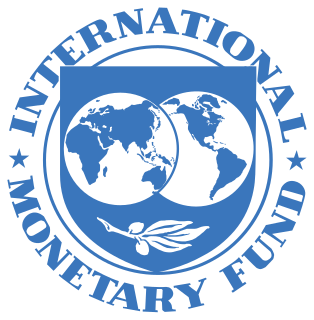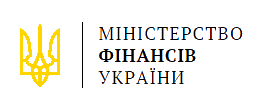Related Research Articles

The International Monetary Fund (IMF) is an international organization, headquartered in Washington, D.C., consisting of 189 countries working to foster global monetary cooperation, secure financial stability, facilitate international trade, promote high employment and sustainable economic growth, and reduce poverty around the world while periodically depending on the World Bank for its resources. Formed in 1944 at the Bretton Woods Conference primarily by the ideas of Harry Dexter White and John Maynard Keynes, it came into formal existence in 1945 with 29 member countries and the goal of reconstructing the international payment system. It now plays a central role in the management of balance of payments difficulties and international financial crises. Countries contribute funds to a pool through a quota system from which countries experiencing balance of payments problems can borrow money. As of 2016, the fund had XDR 477 billion.

The secretary of the treasury is the head of the United States Department of the Treasury, which is concerned with all financial and monetary matters relating to the federal government, and, until 2003, also included several major federal law enforcement agencies. This position in the federal government of the United States is analogous to the minister of finance in many other countries. The secretary of the treasury is a member of the president's Cabinet, and is nominated by the president of the United States. Nominees for Secretary of the Treasury undergo a confirmation hearing before the United States Senate Committee on Finance before being voted on by the United States Senate.

The Department of the Treasury (USDT) is the national treasury of the federal government of the United States where it serves as an executive department. The department oversees the Bureau of Engraving and Printing, and the U.S. Mint; these two agencies are responsible for printing all paper currency and coins, while the treasury executes its circulation in the domestic fiscal system. The USDT collects all federal taxes through the Internal Revenue Service; manages U.S. government debt instruments; licenses and supervises banks and thrift institutions; and advises the legislative and executive branches on matters of fiscal policy. The Department is administered by the secretary of the treasury, who is a member of the Cabinet. The treasurer of the United States has limited statutory duties, but advises the Secretary on various matters such as coinage and currency production. Signatures of both officials appear on all Federal Reserve notes.

The Central Bank of Sri Lanka (CBSL) is the monetary authority of Sri Lanka. It was established in 1950 under the Monetary Law Act No.58 of 1949 (MLA), it is a government owned semi-autonomous body, and following the amendments to the MLA in December 2002, is governed by a five-member Monetary Board, comprising the Governor as chairman, the Secretary to the Ministry of Finance and Planning, and three members appointed by the President of Sri Lanka, on the recommendation of the Minister of Finance, with the concurrence of the Constitutional Council.

The New Zealand Treasury is the central public service department of New Zealand charged with advising the Government on economic policy, assisting with improving the performance of New Zealand's economy, and managing financial resources.
Executive Schedule is the system of salaries given to the highest-ranked appointed officials in the executive branch of the U.S. government. The president of the United States appoints individuals to these positions, most with the advice and consent of the United States Senate. They include members of the president's Cabinet, several top-ranking officials of each executive department, the directors of some of the more prominent departmental and independent agencies, and several members of the Executive Office of the President.
The Office of Fiscal Service (OFS) is an agency of the United States federal government in the United States Department of the Treasury. The office is led by the Fiscal Assistant Secretary of the Treasury. The Fiscal Assistant Secretary reports to the United States Secretary of the Treasury through the Under Secretary of the Treasury for Domestic Finance.

Nemat Talaat Shafik, Baroness Shafik, known as Minouche Shafik, is an Egyptian-born British-American economist who served as the Deputy Governor of the Bank of England from August 2014 to February 2017 and has served as the Director of the London School of Economics since September 2017.
The Committee for a Responsible Federal Budget (CRFB) is an independent, non-profit, bipartisan public policy organization based in Washington, D.C. that addresses federal budget and fiscal issues. It was founded in 1981 by former United States Representatives Robert Giaimo (D-CT) and Henry Bellmon (R-OK), and its board of directors includes former Members of Congress and directors of the Office of Management and Budget, the Congressional Budget Office and the Federal Reserve.
The National Institute of Public Finance and Policy (NIPFP) is an autonomous research institute under India's Ministry of Finance. Based in New Delhi, India, the centre conducts research on public finance and contributes to the process of policy-making relating to public finance. The NIPFP also works jointly with the Department of Economic Affairs at the Ministry of Finance to research the effects of past economic policy.

Giorgos Papakonstantinou, born October 30, 1961 in Athens, Greece, is a Greek economist and politician and former Minister for the Environment, Energy and Climate Change of Greece and former Minister for Finance. He is currently working in an advisory capacity in the private sector.

The Ministry of Finance of Ukraine is a central executive agency in Ukraine charged with developing and implementing national financial and budget policies, and with defining national policies in customs and taxation. The ministry is responsible for ensuring that the state has enough resources to perform its functions and that financial policies promote economic growth.
Economic Advisory Council to the Prime Minister (PMEAC) is a non-constitutional, non-permanent and independent body constituted to give economic advice to the Government of India, specifically the Prime Minister. The council serves to highlight key economic issues facing the country to the government of India from a neutral viewpoint. It advises the Prime Minister on economic issues like inflation, microfinance, and industrial output.

The Fiscal Responsibility and Budget Management Act, 2003 (FRBMA) is an Act of the Parliament of India to institutionalize financial discipline, reduce India's fiscal deficit, improve macroeconomic management and the overall management of the public funds by moving towards a balanced budget and strengthen fiscal prudence. The main purpose was to eliminate revenue deficit of the country and bring down the fiscal deficit to a manageable 3% of the GDP by March 2008. However, due to the 2007 international financial crisis, the deadlines for the implementation of the targets in the act was initially postponed and subsequently suspended in 2009. In 2011, given the process of ongoing recovery, Economic Advisory Council publicly advised the Government of India to reconsider reinstating the provisions of the FRBMA. N. K. Singh is currently the Chairman of the review committee for Fiscal Responsibility and Budget Management Act, 2003, under the Ministry of Finance (India), Government of India.
Petros Christodoulou is a Greek economist and banker.

Dimitris Mardas is a Greek economist and politician who served as Deputy Minister of Foreign Affairs during the Second Cabinet of Alexis Tsipras. He previously served as the Alternate Minister of Revenue in the First Cabinet of Alexis Tsipras. He was a Member of the Hellenic Parliament from 2015 until 2019, representing Thessaloniki B.
Nicholas Theocarakis, also transcribed as Nikos Theocharakis, is a Greek economist and professor of economics at Athens University. He is the author of several books and contributions on economic theory and history of economic thought.
George Chouliarakis, also transliterated as Giorgos Houliarakis, is a Greek academic and politician who served as an Alternate Minister of Finance in the Second Cabinet of Alexis Tsipras, serving under Euclid Tsakalotos. Chouliarakis was formerly the interim Minister of Finance in the caretaker government led by Vassiliki Thanou-Christophilou.
Greece is one of the original members of the International Monetary Fund, joining it on December 27, 1945. It has a quota of 2,428.90 million SDRs and 25,754 votes, 0.51% of the total IMF quota and votes. Greece has been represented on the IMF Board of Governors by Minister of Finance Christos Staikouras since 2019. Greece elects an Executive Director on the fund's Executive Board with Albania, Italy, Malta, Portugal and San Marino. Michail Psalidopoulos is the elected alternate director. Greece has signed two loan agreements with the IMF: a Stand-By Arrangement from 2010 to 2012 and an agreement under the Extended Fund Facility from 2012 to 2016, borrowing a total of 27,766.3 million SDR. Greece owes the IMF 6,735.64 million SDR, and is the fund's third-largest borrower. In 2018, the fund began conducting annual post-program monitoring of Greece in addition to its annual Article IV consultation.
References
- ↑ "Purpose". Public Debt Management Agency. Retrieved 7 June 2016.
- ↑ "Greece". OECD Stats. Retrieved 7 June 2016.
- ↑ "Board of Directors". Public Debt Management Agency. Retrieved 7 June 2016.
- ↑ Hope, Kerin (19 February 2010). "Head of Greek debt office replaced". Financial Times. Retrieved 7 June 2016.
- ↑ Papadimas, Lefteris (27 November 2012). "Greece appoints new debt agency chief: source". Reuters. Retrieved 7 June 2016.
- ↑ Dunbar, Nicholas; Martinuzzi, Elisa (6 March 2012). "Goldman Secret Greece Loan Shows Two Sinners as Client Unravels". Bloomberg. Retrieved 7 June 2016.